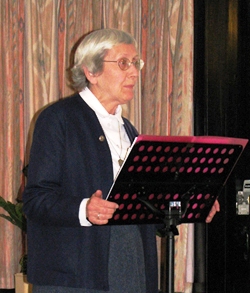![]()
The Words of the Rennie Family
|
|
The Words of the Rennie Family |

'The Impact of Migration on Families Worldwide' By Sister Kate Holmstrom:
Bonjour! Buenos dias! Dzen dobre! Al-salam al-lekum! Namaste! Jambo! Nee ha!
An event focusing on Families and Migration gathered about 35 people at the Quaker Centre, Milton Keynes, on 15 May, observing UN International Day of Families 2010, at the invitation of Christa Rennie of the WFWP (Women's Federation for World Peace) and her husband David, of the Universal Peace Federation. Navrita Atwal from the MK Equality Council spoke on "Family Values from an Asian Perspective", Ayser Ali on "The Journey of a Family from Iraq to the West", I (Sr. Kate) on my experience with refugee and immigrant families in London, Milton Keynes and Yarl's Wood Immigration Removal Centre, and David on the "Vision of the Universal Peace Federation".
The notes below are the observations of Sister Kate Holmstrom, one of the four speakers. The evening program included the presentation of an Ambassador of Peace award to Navrita Atwal, a very passionate campaigner for peace and social issues in the town. Sister Kate wrote her observations on 'The Impact of Migration on Families Worldwide' for the newsletter of the Peace and Justice Network MK. With her kind permission we publish the report including her poem, on our website.
The Women's Federation for World Peace together with the Universal Peace Federation were the hosts for this event which was a first for Milton Keynes.
I feel Mum's worry, sense her
sadness.
Where's my Dad? She's never said,
Never told me of the
madness,
Of the reason why we fled.
I remember that night, hiding
While
the soldiers searched and swore,
Shouting that they'd surely find
him,
Battering upon the door.
I could hear my mother screaming
As
those soldiers laughed and jeered.
I heard: "Rape!" --
what is its meaning?
Was that what she'd so much feared?
Now we're here. I speak your
language,
But the nightmares haunt me still.
Life goes on …
we have to manage.
This I've learnt: I'll never kill.
Kate Holmstrom, Oxford
Between us, we made the following points: Migrating can be a huge gift, promoting openness to other cultures and the enrichment of learning other languages. "Home is wherever the family is". However, moving can also be destabilizing, and come at a bad age such as adolescence, when friends are all-important. Despite lessons in their mother language and the support of their ethnic or religious community, it happens sometimes that youngsters grow up feeling neither totally integrated in the new country nor accepted in their country of origin if they return there. The importance of family meals was stressed: parents -- particularly from cultures where eating together is taken for granted and seen as a significant family value encouraging respect and caring -- have difficulty sometimes in gathering the children when there is competition from other activities. Keeping in touch physically can be problematic as the family members grow up and move away: "Why should I need to make the journey back to visit when we can speak on the phone and even see each other with the web-cam?" If the migrant parents cannot learn English as fast as their offspring certainly will do, there is the risk of a widening rift in understanding in the family.
Migration presents many challenges. The English climate is a terrible trial! The food is different; in England we do not bargain when shopping. One may be restricted to vouchers and handouts. Beating naughty children is forbidden; standards of teenage behavior for example may be at variance with those of original cultures. Different attitudes towards marriage may be disconcerting. Although interpreters and English lessons are often available for both adults and children, managing in an administrative office, a doctor's surgery, (maybe… after torture or rape …), giving birth in a strange hospital, is very difficult. The children get used to being called upon to translate for their parents, and taking on other responsibilities which may weigh upon them.
A recurring suffering for migrant families is separation. They have left behind home and land, work, activities, friends, and all too often, some of the family. No more, the gathering under one roof of several generations. In refugee situations, it can often happen that one child is left behind to be looked after by a relative, or children are lost, or a dad goes first and the mother joins him in Britain later with the children or only some of them. It is not easy for any member to find and (re)assert their place in the reconstituted family. Detention in a Removal Center entails even more acute separations, aggravated by the shock of suddenness. Yarls Wood has a friendly staff and interesting facilities. The family unit is bright and welcoming. But the children sense the anxiety and frustration of their parent(s) and miss the familiarity of home life, food cooked by Mummy, their toys, school, friends.
A source of great solace to many migrants is their religion. Praying alone or with others in a church or faith room, making devotions in a temple, observing Ramadan … is immensely reassuring and uniting. I was at lunch in the Family Unit at Yarls Wood. A recently arrived mother is very upset, her toddler fretting. The 6 year old daughter prattles on merrily, telling me about her favorite cereals at breakfast and her friend's birthday party (in the Center). I turn to the mother: "Are you able to feel, in spite of everything, that God is looking after you?" Before she can answer, the little girl chips in: "Yes, she knows because I told her!" I say: "You're right. And perhaps she's told you that too?" -- "Yes … but you can forget …"